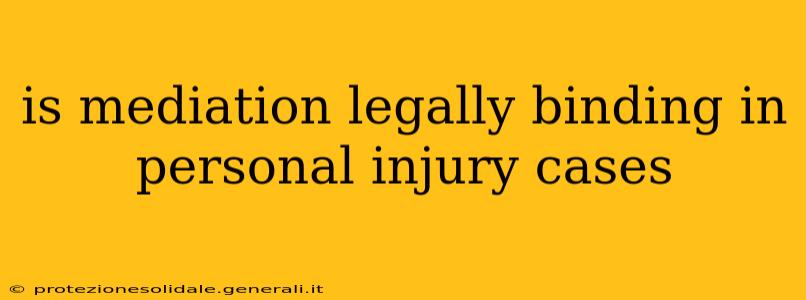Mediation is a popular and often effective method for resolving personal injury claims outside of a courtroom. However, a common question arises: is the agreement reached during mediation legally binding? The answer is nuanced and depends on several factors. While the mediation process itself isn't legally binding, the agreement reached during mediation usually is, provided it meets certain criteria.
What Happens During Mediation in Personal Injury Cases?
Before delving into the legality of mediation agreements, let's understand the process. In personal injury mediation, a neutral third party, the mediator, facilitates communication between the injured party (plaintiff) and the at-fault party (defendant), or their insurance representatives. The mediator doesn't make decisions; instead, they guide the parties toward a mutually agreeable settlement. This often involves exploring the strengths and weaknesses of each side's case and negotiating a fair resolution. Crucially, all communication during mediation is generally confidential.
Is a Mediation Agreement Legally Binding?
A key question many people have is whether the agreement reached during mediation is legally binding. The short answer is: yes, usually. Once both parties agree to a settlement and sign a legally sound agreement, it becomes a legally binding contract. This contract is enforceable in a court of law, meaning that either party who breaches the agreement can be held accountable.
However, there are exceptions. A mediation agreement might not be binding if:
- The agreement is not properly executed: This means the agreement lacks the necessary signatures, or it’s not properly witnessed or notarized as required by law.
- There's evidence of duress or undue influence: If one party feels coerced or pressured into signing the agreement, it might be deemed invalid. This could involve threats, unfair bargaining tactics, or taking advantage of someone's vulnerability.
- The agreement is unconscionable: This refers to agreements that are so unfair or one-sided that a court would refuse to enforce them.
- There was a mutual mistake of fact: If both parties based their agreement on incorrect information, the contract might be voidable.
- The agreement is illegal: Naturally, any agreement that violates the law is not enforceable.
What Happens if One Party Breaches the Mediation Agreement?
If one party fails to uphold their end of the mediation agreement, the other party can take legal action to enforce the agreement. This typically involves filing a lawsuit to compel the breaching party to fulfill their obligations. The court will then review the agreement and determine whether it's valid and enforceable.
Can I Withdraw from Mediation Before an Agreement is Reached?
Yes, either party can withdraw from mediation at any time before a formal settlement agreement is signed. While it's generally advisable to attempt to resolve the matter through mediation, it is not compulsory.
What if I'm Unsure About the Terms of the Mediation Agreement?
It’s highly recommended to seek independent legal advice before signing any mediation agreement. A lawyer can review the terms, ensure they are fair and protect your interests, and guide you through the process. Don't hesitate to ask questions and clarify any ambiguities.
Is Mediation Mandatory in Personal Injury Cases?
No, mediation is not mandatory in personal injury cases. It’s a voluntary process. However, many courts encourage or even require parties to attempt mediation before proceeding to trial. This is because mediation offers a more efficient and cost-effective way to resolve disputes compared to lengthy and often expensive litigation.
Can the Mediator Enforce the Agreement?
No, the mediator's role is solely to facilitate the negotiation process. The mediator does not have the power to enforce the agreement. That authority rests with the courts.
By understanding the legal implications of mediation in personal injury cases and seeking appropriate legal counsel, individuals can navigate the process effectively and confidently. Remember, a well-structured and fairly negotiated mediation agreement offers a powerful alternative to costly and time-consuming litigation.
